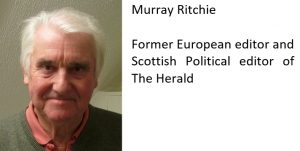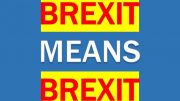Supporters of Scottish independence are increasingly optimistic as Indyref2 approaches. The reasons are not difficult to find, writes Murray Ritchie.
Just as Brexit is paralysing British politics, so the prospect of a second independence referendum in Scotland is dominating debate north of the Border. And with good reason.
First Minister Nicola Sturgeon’s Scottish National Party (SNP) are on a roll again. Despite Unionists’ persistent criticism of her party’s alleged failings in health and education – the two most important powers devolved to Holyrood – her party is still miles ahead in the popularity stakes.
Those endless cries from the Tories and Labour to “get on with the day job” in hospitals and schools and stop obsessing about constitutional change appear to be wasted breath.
The astonishing collapse of support for Labour in its one-time Scottish stronghold – a derisory 9 per cent in the Euro-poll – was just the latest sign of politics moving Nicola Sturgeon’s way exactly when she needs it.
In last month’s elections for the European parliament, the SNP took half of Scotland’s six seats with almost 40 per cent of the vote – up from 29 per cent – while Labour entered what has been called its death spiral.
In pro-EU Scotland Brexit was only partly to blame. Jeremy Corbyn’s faffing about on this most crucial of issues was the final straw for many of his traditional supporters who glumly saw their party humiliated with its lowest ever support.
The Tories salvaged one seat and the Brexit party also scraped one. The Liberal Democrats took the other. But the Euro-elections are just the latest in a string of indicators alarming Unionists. A recent poll by YouGov suggested the Yes and No campaigns are now neck and neck with the second referendum probably just over a year away.
Should Scotland be an independent country?
Yes – 49%
No – 51%
Highest Yes vote since Feb 2015https://t.co/t9rAfXYzuG pic.twitter.com/lO1zJwFZYt— YouGov (@YouGov) 27 April 2019
Polls suggest that most Scots don’t relish the idea of Indyref2 any time soon – too much division and political argy-bargy only adding to the Brexit agony. But the same polls show that when it does come it will quite possibly result in the end of the 1707 Treaty of Union with England.
Excited Yes campaigners point out that in 2014 they started with about 30 per cent support and ended with 45 per cent. Next time a start of around 50 per cent would almost guarantee success, they believe.
Some might argue that the SNP’s progress is not solely down to its popularity but owes more to the incompetence of its rivals.
Scottish Labour’s historic determination not to devolve its own internal party structures is also partly to blame. Often chided as no more than a supine servant of its Westminster bosses, Labour has done nothing to help itself and its image as a branch office of London.
The party’s Scottish leader, Richard Leonard, a disciple of Corbyn, is widely regarded as woefully ineffective. He gives the impression of being willing to lose if he can only remain pure in Leftist dogma. A bit like Corbyn himself.
In last month’s elections for the European parliament, the SNP took half of Scotland’s six seats with almost 40 per cent of the vote – up from 29 per cent – while Labour entered what has been called its death spiral.
Ruth Davidson, the Scottish Tory leader and poster girl for the Tory press, was hardly missed when she took maternity leave, if the polls are accurate. She may be popular south of the Border and even talked of as a prospective prime minister – she’d need a Commons seat for that – but her appeal within her party does not seem to move the needle of public opinion on independence.
Her Scottish Tory MPs’ notorious “Operation Arse” aimed at blocking Boris Johnson’s road to 10 Downing Street was fun at the time but now shows signs of wilting in the face of Johnson’s start in the Tory leadership race.
Boris has a history of hostility to Scotland dating back to his days as Mayor of London. He has issues with the Barnet Formula which calculates how the four home nations divide the spending cake. He claimed – in provocative language – it was unfair to England and scandalously “subsidised” Scotland. (That’s an argument for another day).
He holds to the canard that Scotland’s share of public spending is simply a “present” from England.
Suffice to say Boris is anathema north of the Border, even among some in his own party. The idea of him as prime minister would be a dream come true for the SNP.
Other prominent Tories have helped the SNP in their own unintentional ways. The latest was Sajid Javid, the Home Secretary, who said if he was prime minister he would “not allow” Indyref2. He knows now that unpopular English Tories telling touchy Scots what they are allowed and not allowed is not a great vote winner.
So, what could derail the SNP now? Most obviously Brexit being cancelled.
Much importance has been paid by Sturgeon to the iniquity of Scotland voting Remain and being told that doesn’t matter, and being told five years ago to vote No to independence so that Scotland could remain in the EU.
Brexit failing to happen would remove a helpful source of political resentment that the SNP are expert in exploiting.
Which is why at the back of Ms Sturgeon’s calculating mind is the recognition that while she has good cause to be optimistic, her ambitions could still be frustrated by a twist in Britain’s long and tortuous constitutional wrangling.
If a week is a long time in politics then anything could happen in the coming 18 months – or longer.

Featured Image Credit: Ulmus Media/Shutterstock.com




